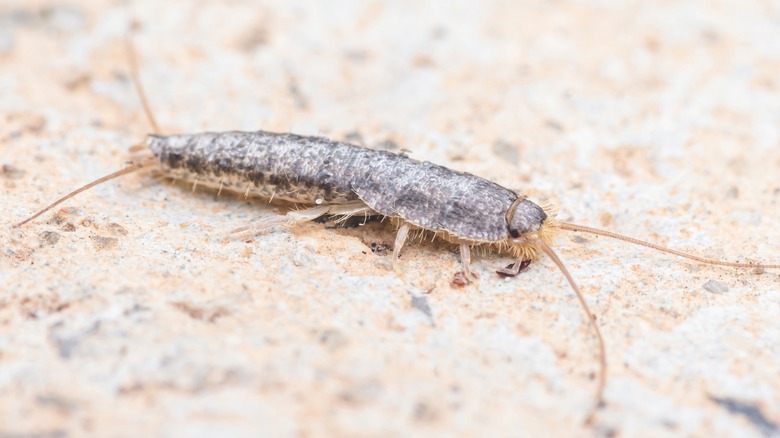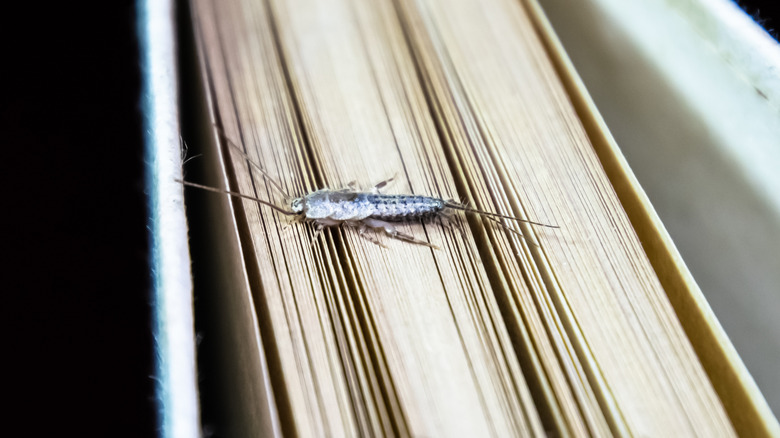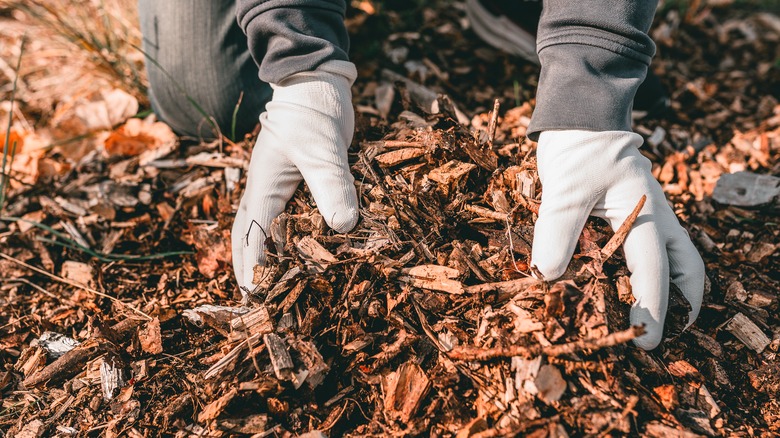This Crucial Mulch Mistake Is Maybe The Reason For Your Silverfish Problem
Your house is a sanctuary, refuge, and safe space that you can tailor and customize however you wish. People put a lot of effort, as well as thousands of dollars, into curating their home environment, which is why every homeowner's nightmare is harboring pests that can come in, reproduce, and destroy it all.
Most people are terrified of termites and rats, but you should also be wary of silverfish. These tiny insects are vital to the ecosystem due to their involvement in the soil decomposition of organic material. Unfortunately, in their quest for food sources, they often find their way into your house and cause all sorts of mayhem. If you are suffering from a silverfish problem, you should check your gardening habits. Using wet mulch is great for the soil, but it could be a major reason why your home has silverfish pests — they love moisture.
Gardening mulch comes with a ton of benefits, including controlling weeds, providing soil nutrients for plants, and regulating moisture. There are many types of mulches you can choose from that suit your garden's individual needs, such as wet, dry, organic, and inorganic mulch. If your area is prone to silverfish, you'd be making a critical mistake using wet mulch in your garden.
Silverfish move from your yard to your house in unfavorable conditions
If you regularly apply wet mulch on your garden or grass topsoil, then this can attract silverfish to it because it's their ideal habitat. If you keep finding silverfish inside your house, it's time to find alternative ways to mulch your yard. Organic mulch is often moisture-laden, so a silverfish infestation would elbow this practice right out the door.
Unfavorable conditions cause the silverfish to migrate from the soil to your home. While silverfish desire moisture, they will leave areas with wet mulch once they become waterlogged. They will also move from the area once the wet organic mulch runs dry over time. From your yard, the pests move through cracks and openings into your home. Although they aren't known to be harmful or spread diseases to us, they can harm your property. They are attracted to dark places with high moisture, which is why when they invade your home, you can usually find them in rooms like your bathroom, kitchen, and basement.
The pests roam in search of food with high starch content. That includes cardboard, books, fabrics, sugar, pasta, and even dandruff. You'll have to lock up your food in airtight storage containers, fix up leaky pipes in the basement, and dehumidify damp spaces. The most effective solution to dealing with silverfish, however, is calling in professional pest control.
Mulching alternatives for your yard and garden
Mulching your garden is an important part of tending to your yard, but you don't have to suffer through a silverfish pest infestation just to keep your ground hydrated and weed-free. Thankfully, there are other ways that you can practice it without using wet mulch. You can use dry or inorganic mulch, such as rubber pellets, dry leaves, polyethylene film, or even gravel to mulch your garden.
Of course, the type of mulch you'll eventually settle for has to be tried and tested on your garden first. Some mulch materials like plastic and rubber heat the ground by channeling all the heat around them. You have to check if this will blow over well with your plants before incorporating them into your gardening routine. Inorganic mulch also doesn't have nutritional value, so they don't provide the soil with anything. Hence, your plants won't be gaining much from them aside from moisture retention and weed suppression.
Dry organic mulch such as wood chips, pine needles, and straws are much more beneficial to the soil because they can decompose and add nutrients to the soil. Either way, your choice to use dry mulch will combat the silverfish population and let them know they aren't welcome in your yard.


